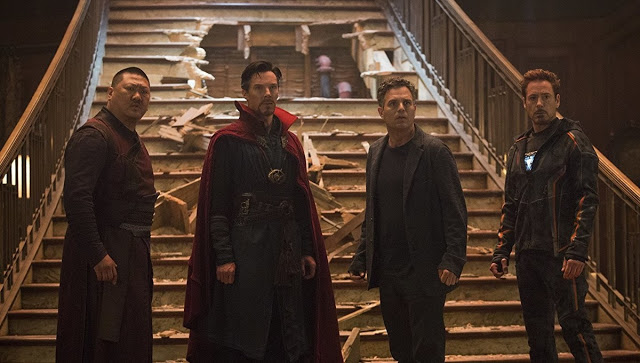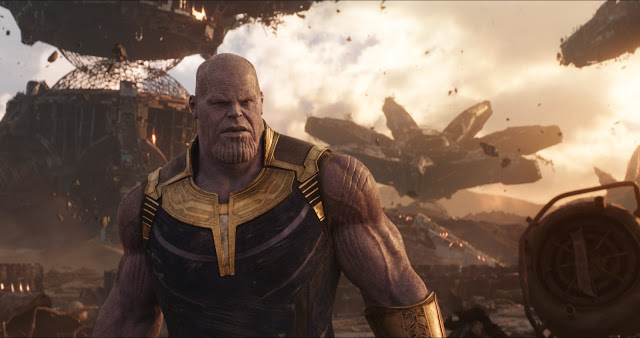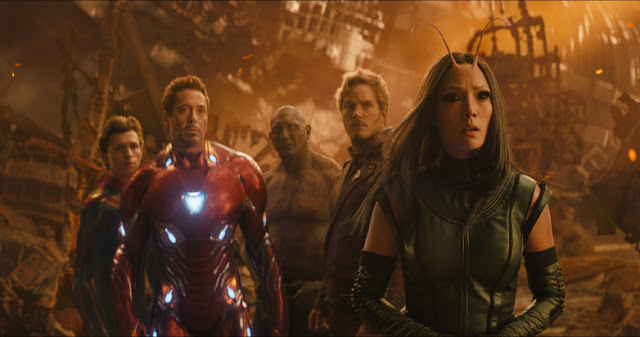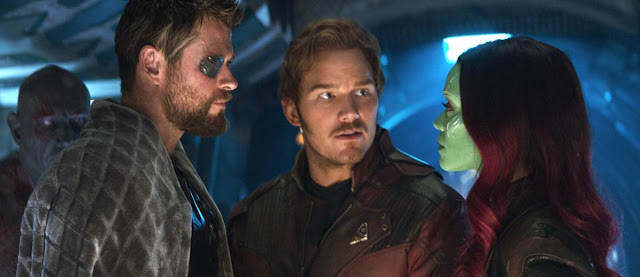Vaulting through the interplanetary air, sticky webs shooting from his genetically altered wrists, Spider-Man issues a sincere apology. “I’m sorry,” he says to his plummeting compatriots as he slings gobs of gummy goo at them, yanking them out of their falls and saving them from certain death. “I can’t remember anyone’s names.”
Can you blame him? The nineteenth official installment in the gargantuan compendium known as the Marvel Cinematic Universe, Avengers: Infinity War arrives as the ultimate crossover event, a superhero greatest-hits collection most notable for its sheer tonnage. No fewer than eight major characters here have already headlined their own standalone films, while countless others—all played by recognizable actors—have carved out sizable territory as villains, foils, squeezes, and sidekicks. The closing credits sequence alone feels like a breathless roll call, cramming as many high-profile names above the fold as possible, just so nobody’s agent complains about their client getting the shaft.
Directed by Anthony and Joe Russo from a screenplay by Christopher Markus and Stephen McFeely, Infinity War is a lumbering, weirdly fascinating creature, a hulking leviathan scarred with thorny contradictions. It’s enormous but works best in small moments. It’s doggedly democratic, scrupulously dividing screen time across its horde of principals, yet it’s also ruthlessly plotty, with every scene devoted to further heightening its central conflict. And while it’s uniformly well-acted, it features only one memorable character.
That would be Thanos, the colossal, lavender-skinned demigod voiced with gravelly gravity by Josh Brolin. To this point, Thanos’ supervillainy has been largely theoretical; if you’re a student of the MCU, you may remember him from a quickie cameo in the first Guardians of the Galaxy and a winking post-credits appearance in the prior Avengers movie, Age of Ultron, but he never did much beyond smirk and sneer. (If you aren’t a student of the MCU and instead just stumbled into Infinity War by mistake, I pity your certain confusion.) But he’s front and center here, and while he initially scans as another generic megalomaniac, his motivations for terrorizing our human and alien saviors prove more complicated. Wracked by childhood memories of suffering and starvation brought on by every economist’s greatest quandary—the scarcity of resources—he develops a radical plan: He will acquire the mythical Infinity Gauntlet, which will allow him, with a literal snap of his fingers, to eradicate exactly half of the universe’s population, thereby allowing the remaining half to flourish.
Which, well, whatever. It is true that some of the MCU’s recent films have fielded a political dimension—the interventionist dilemmas of Captain America: Civil War, the racial identity issues of Black Panther—adding some allegorical punch to all the mindless kicking and jumping. But while I recognize that overpopulation is a legitimate ecological issue, I refuse to debate the philosophical merits of a movie about a giant purple thug trying to steal a bejeweled glove. Besides, Infinity War is as concerned with environmental trauma as Ant-Man was worried about insect welfare. No, the sole purpose of this movie is to leverage the mushrooming existence of the MCU itself. Having spent the past 10 years exhaustively assembling its many members, Marvel now flings them all into the same cacophonous fury, with their mere convergence expected to function as its own reward.
To be fair, there are some other rewards. Sure, Avengers: Infinity War is a crassly commercial enterprise that preys on its fans’ blind adoration, but that doesn’t prevent the Russos from occasionally entertaining them (OK, us—for the most part, I like Marvel’s movies). With so much groundwork having been laid in the form of past films, most of the characters are already sufficiently developed, which means the script doesn’t need to waste time with tedious backstory; instead, the Russos arrange our heroes into new formations, almost as though they’re experimental scientists testing the alchemy of various groupings. And so, Thor (Chris Hemsworth) gets to hang out with the Guardians of the Galaxy, led by Star-Lord (Chris Pratt), who amusingly finds his masculinity threatened by the Norse god. Elsewhere, Iron Man (Robert Downey Jr.) teams up with Doctor Strange (Benedict Cumberbatch), resulting in an implicit challenge of who can behave with greater withering superiority. Captain America (Chris Evans), sporting a beard that’s cinematic shorthand for living off the grid, meets both Black Panther (Chadwick Boseman) and the plant creature Groot (Vin Diesel), leading to an introduction that doubles as one of the movie’s funniest lines. Spider-Man (Tom Holland) makes some adorable movie references, the Winter Soldier (Sebastian Stan) flexes his mechanical arm, and Peter Dinklage shows up as a giant dwarf king, because why not?
I could describe more—I enjoyed the odd friendship between Thor and Bradley Cooper’s Rocket, with the God of Thunder repeatedly referring to his new raccoon friend as a “rabbit”—but I don’t get paid by the word. The paradox of Infinity War is that it packs together so many characters, it can’t devote adequate time to any of them. (And it still doesn’t include Paul Rudd’s Ant-Man, whose absence is at least explained away; neither Jeremy Renner’s Hawkeye nor Tessa Thompson’s Valkyrie is even mentioned.) The movie runs a hefty 149 minutes, but that’s nowhere near enough time to explore its several-dozen heroes with any depth or insight. There are slivers of potentially interesting dramatic moments here and there: Scarlet Witch (Elizabeth Olsen) and Vision (Paul Bettany) have developed a winsome misfit romance; Natasha Romanoff (Scarlett Johansson) has unresolved sexual tension with Bruce Banner (Mark Ruffalo), who meanwhile is struggling to transform into his alter ego Hulk; Tony Stark and Pepper Potts (Gwyneth Paltrow) are planning a wedding but still wrestling with the former’s avenging obligations. Yet while all of these figures are portrayed by excellent actors, the material is pure throwaway, suggesting only that it might be further addressed in future standalone installments, when the characters aren’t dutifully sharing the screen and collaborating to stop an unhinged titan.
Oddly enough, it is that titan who supplies Infinity War with its sense of purpose, both narratively and emotionally. Thanos is an absurd creation, a monstrous ravager who’s basically invulnerable. Yet if Brolin’s performance doesn’t exactly make his heavy sympathetic, it does provide him with a surprise degree of shading and weird loneliness. This is most evident in Thanos’ twisted relationship with Gamora (Zoe Saldana), the green warrior whom he once adopted as his daughter—after slaughtering her homeland and her biological parents, naturally—but who now serves with the Guardians, nursing a lifetime of anger toward her world-conquering father. The movie’s strangest sequence involves a solemn journey that Thanos and Gamora take to a distant volcanic planet called Vormir, where the film’s relentless chaos melts away, replaced by a gentle, elegiac pathos.
Of course, the ostensible reason for that sojourn involves a search for one of the sacred Infinity Stones, the six magical gems that, if simultaneously possessed by Thanos, would allow him to complete the Gauntlet and cleave the world in two. I’ll leave it to comic-book experts to explain the particular functions of the various rocks, all of which have ominous names like the Power Stone and the Reality Stone; for our purposes, all you need to know is that Thanos wants them, and the Avengers want to stop him—hence the film’s title. (Apparently, “Avengers: The War of the Six MacGuffins” didn’t have the same ring to it.)
This means that Infinity War is essentially structured as a daisy chain of escalating battles, with our innumerable heroes repeatedly facing off against Thanos and his various flunkies. This repetition brings with it the threat of drudgery, but the Russos do well to diversify the combat, helping to stave off the encroaching numbness. Most of the action—a rumble between wizards on the streets of New York, a somersaulting skirmish on a distant rocky planet, a massive Lord of the Rings-style clash in Black Panther’s kingdom of Wakanda—is presented competently, with decent special effects and the occasional character-specific quirk. At the same time, a sense of panic creeps into the proceedings, as though the Russos are just trying to keep this humongous piece of blockbuster fabric from splitting at the seams. They’re so busy making the action sturdy that they forget to make it fun; certainly, there is none of the brilliant dynamism that animated the famous airport brawl in Civil War. Instead, what we get is proficiency without distinction.
For the vast majority of its running time, Avengers: Infinity War scrapes by as a collection of reasonably appealing moments that add up to nothing in particular. But then, in its final moments, something genuinely extraordinary happens: This mega movie—so padded and predictable and safe—becomes memorable.
I don’t want to spend too much time dissecting Infinity War’s finale, partly to avoid spoilers, and partly because it seems foolish to fixate on a sequence that constitutes just a few minutes within a two-and-a-half-hour movie. That said, having previously watched dozens of superhero flicks that all seem to end the same way—with a hectic battle that carries no real stakes—it is immensely gratifying to experience a climax that feels like it matters. I have no doubt that the game-changing conclusion of Infinity War will ultimately be retconned, rejiggered, or otherwise manipulated to ensure maximum financial gain; after all, the only fans whom Marvel truly serves are its shareholders. But that future expectation doesn’t dilute the power of the moment itself, the one scene in the movie that the Russos execute with breathtaking panache.
Nevertheless, there remains the rest of the film to consider, and I keep coming back to the concept (or a concept) of the Time Stone. Avengers: Infinity War is long and loud and busy, but it makes dubious use of all that time and noise; until that jaw-dropping finale, it’s mostly running in place, without really doing much of anything. Maybe that isn’t the Russos’ fault; perhaps the blame lies with the broader concept of the MCU in general. After all, when your movie is designed to be both the culmination of everything that came before and a springboard for everything still to come, there is no time for the present.
Jeremy Beck is the editor-in-chief of MovieManifesto. He watches more movies and television than he probably should.




